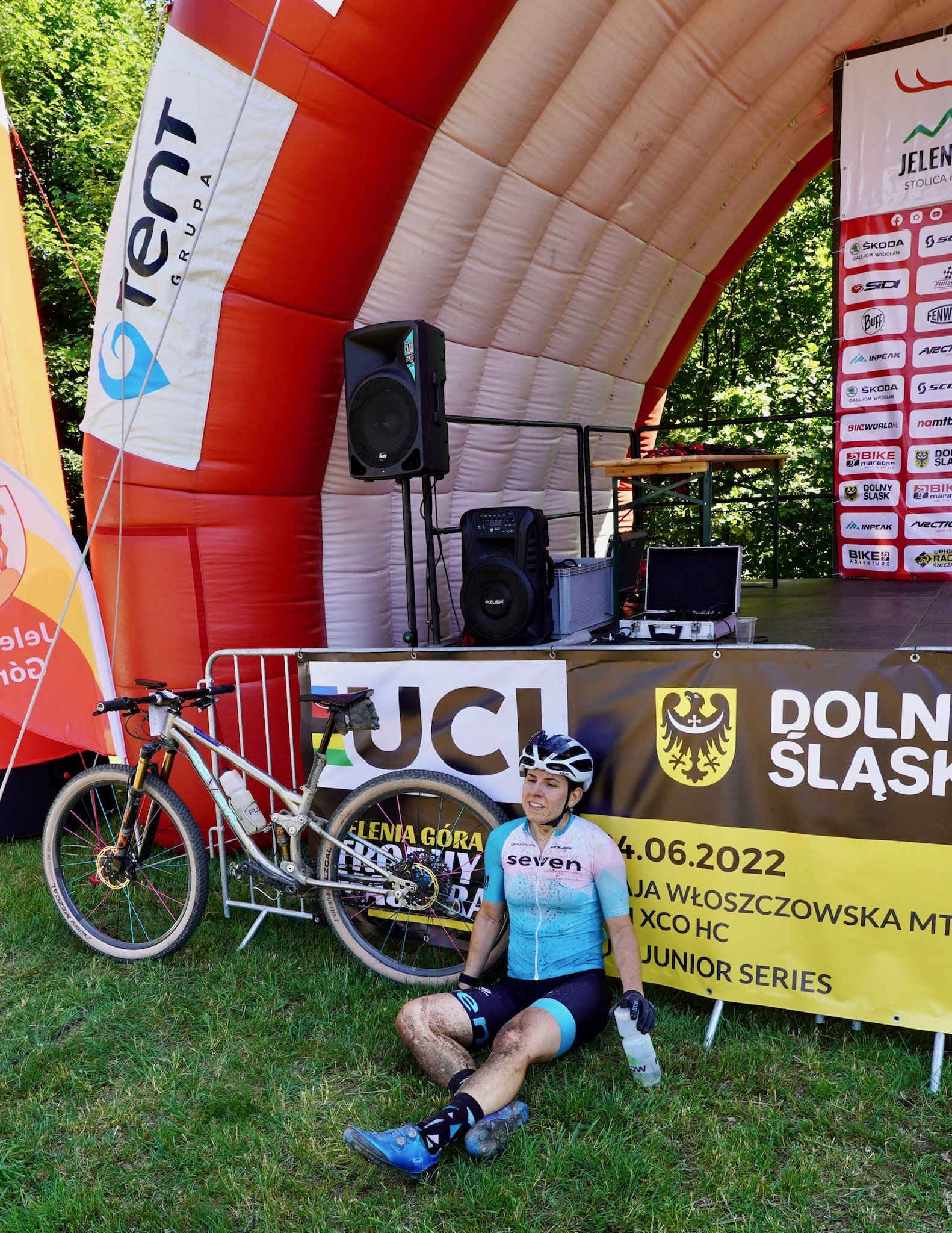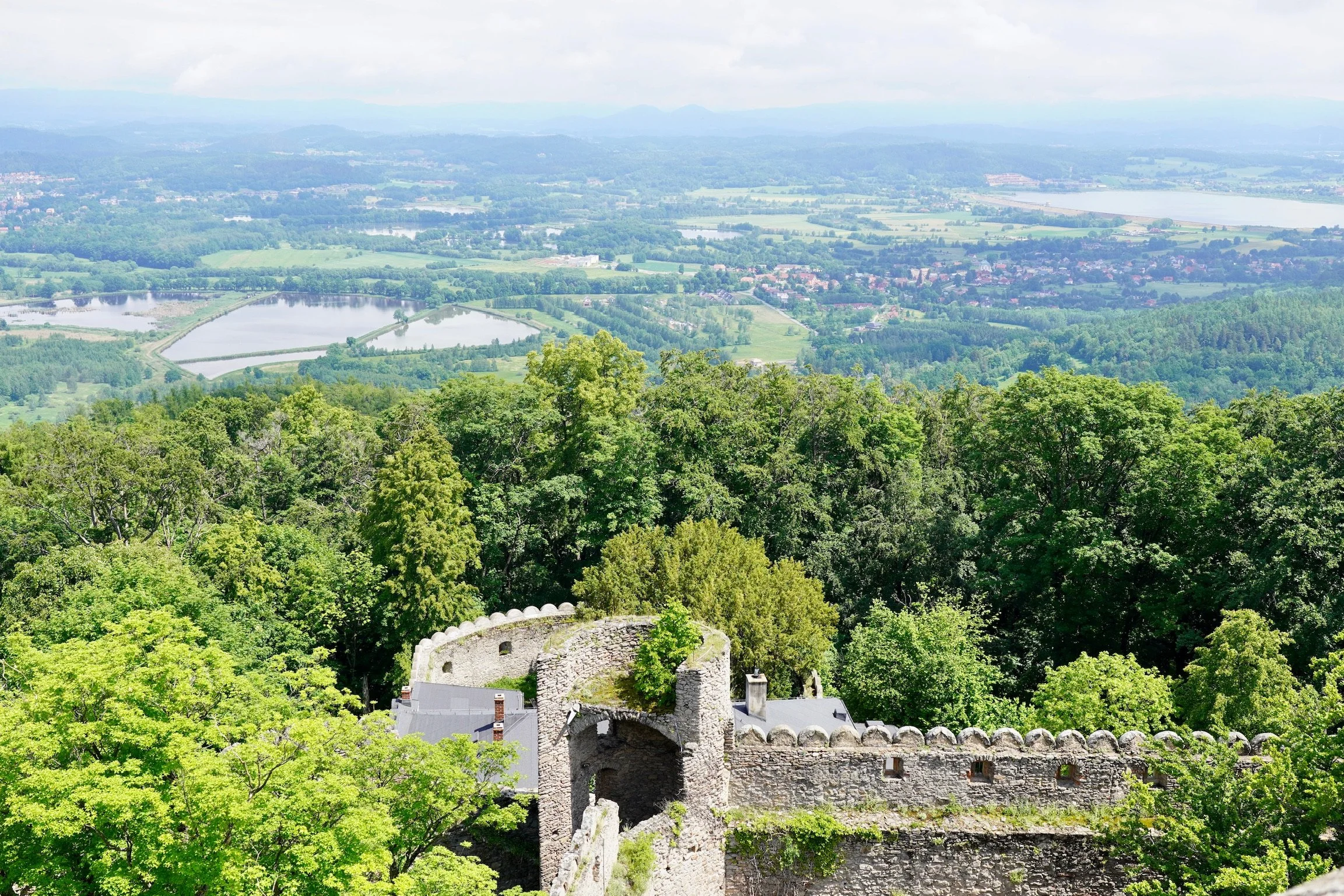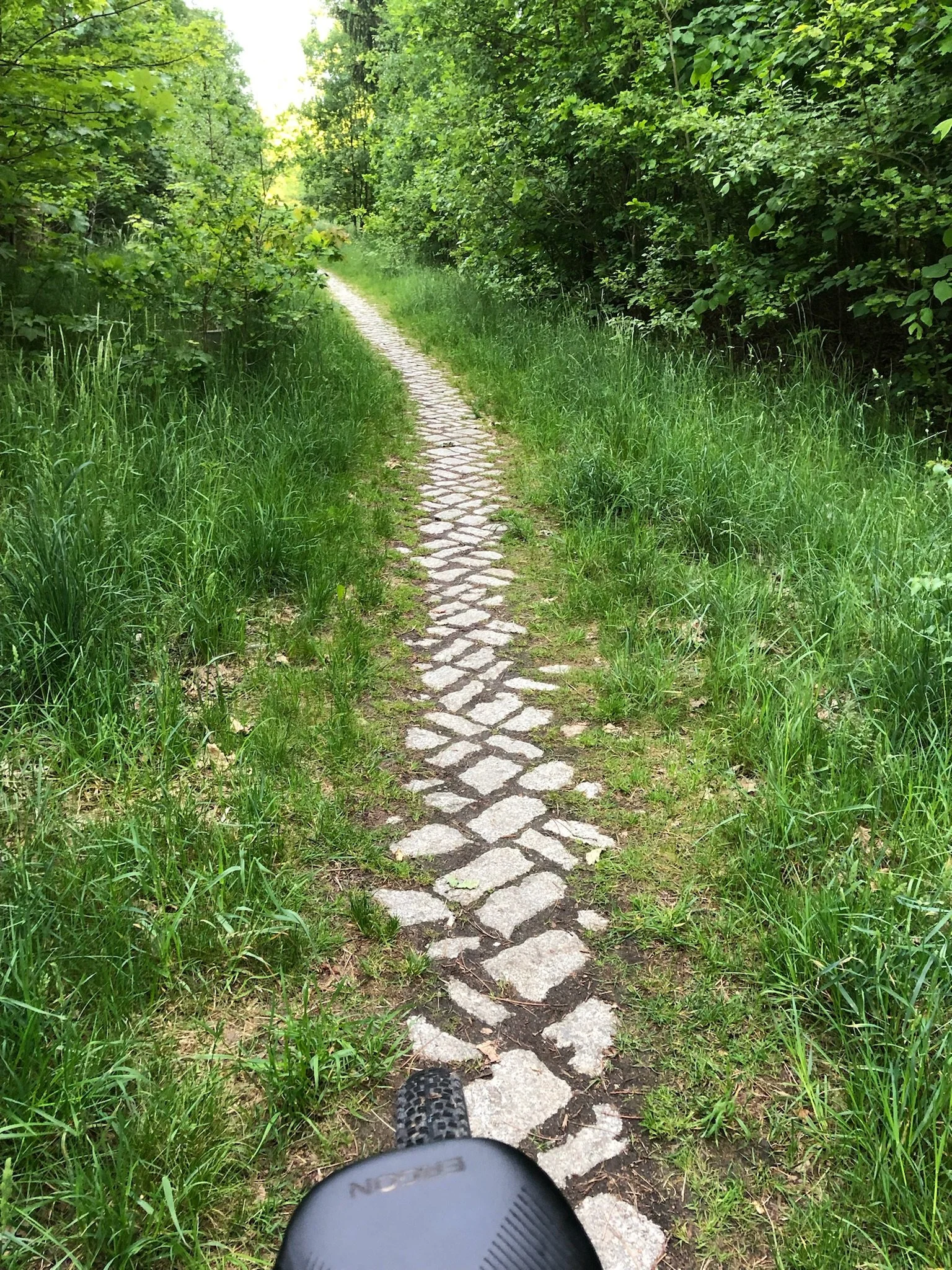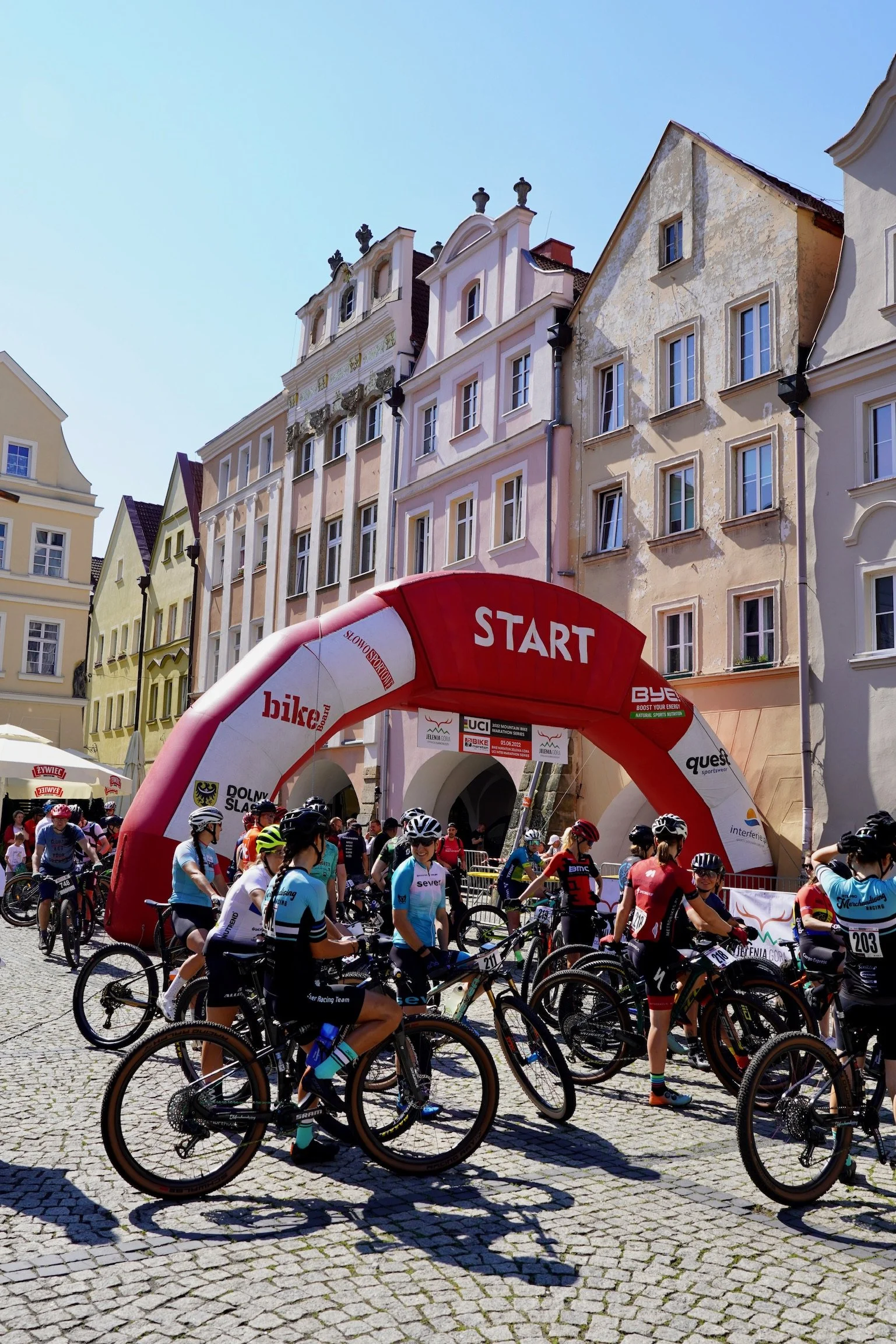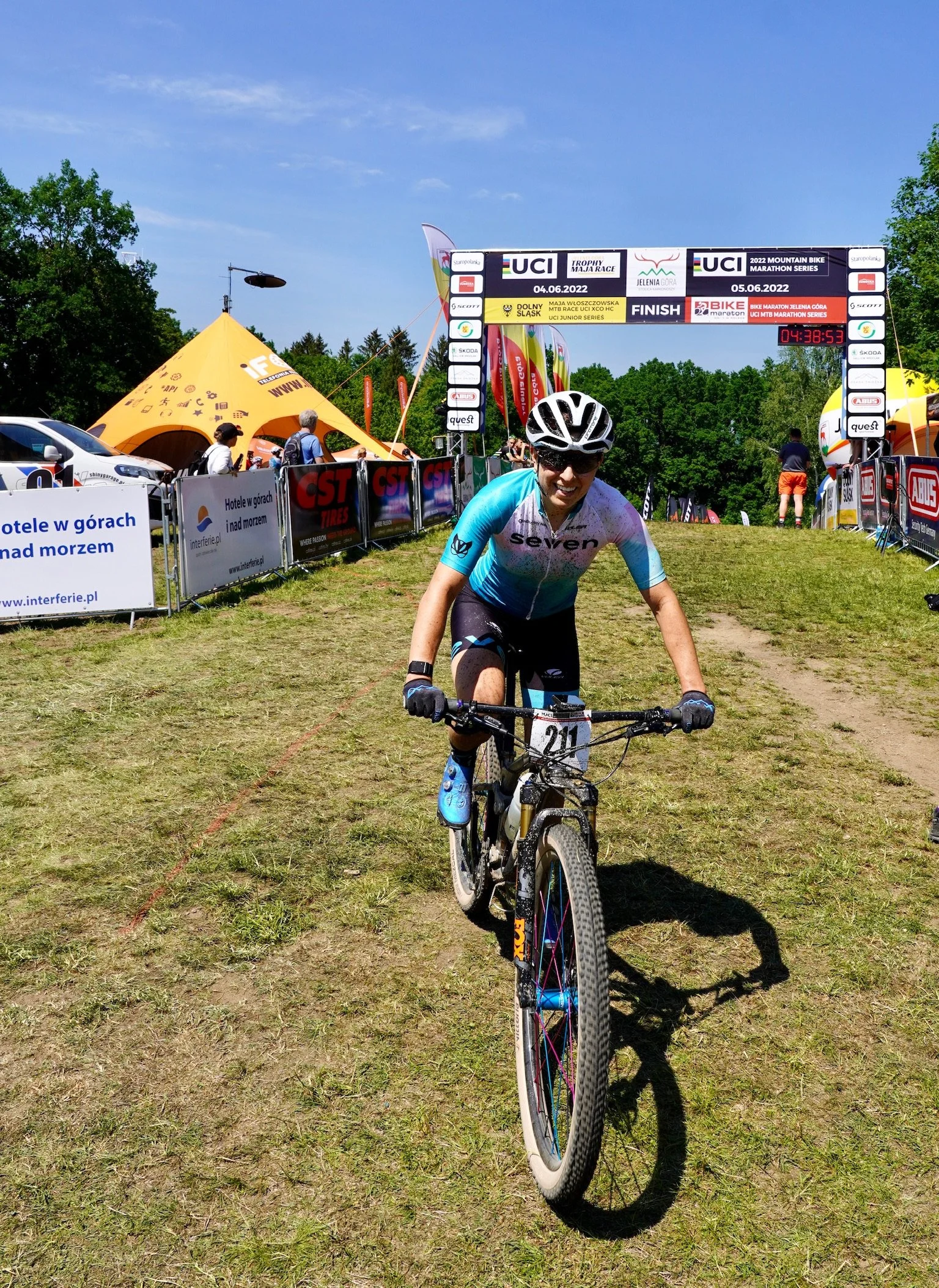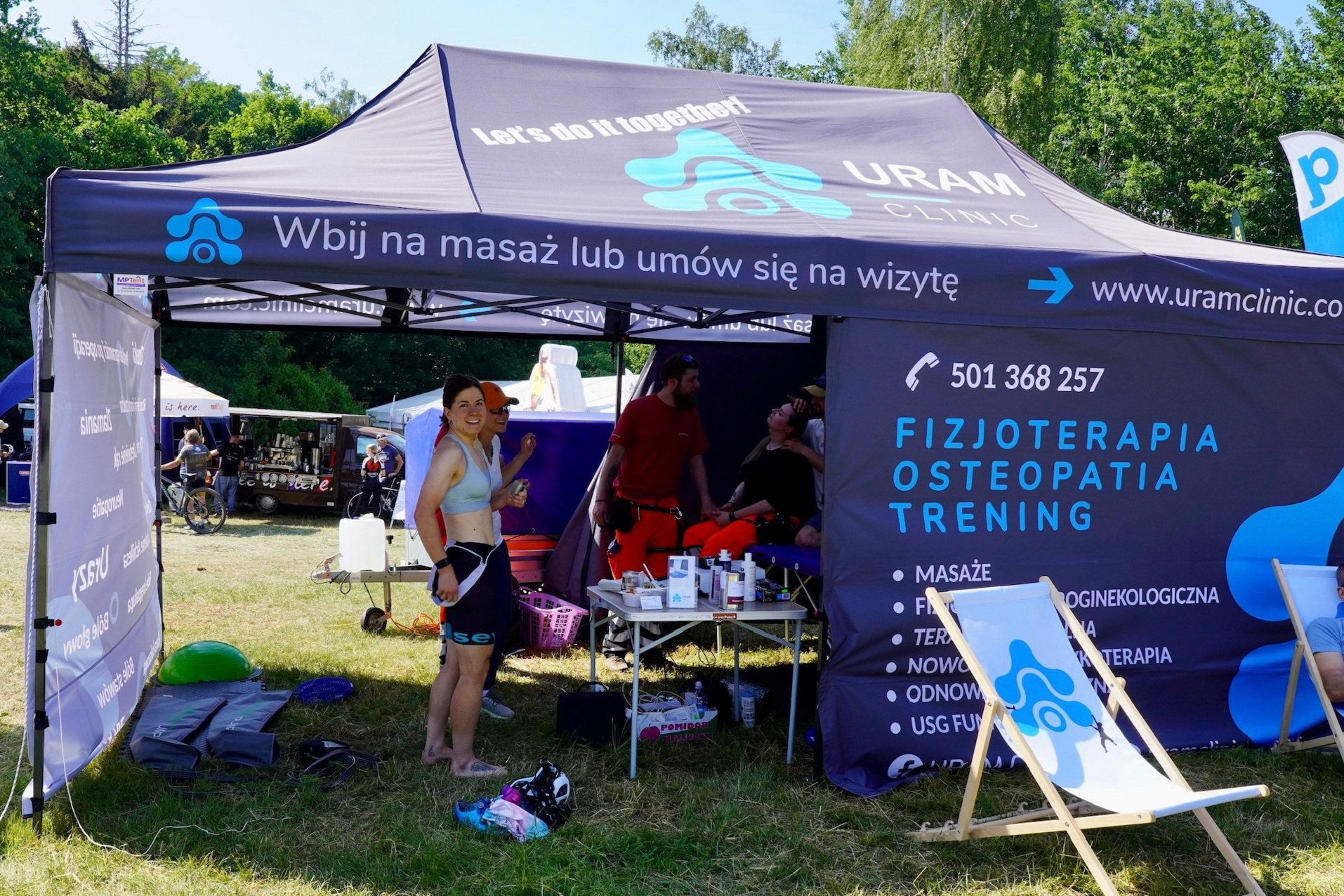Promptly after booking our flights for the UCI MTB Marathon Series race in Jelenia Góra, two consecutive thoughts crossed my mind. The first thought was “pierogi paradise!” followed closely by “Holy crap. What did I just do?”. Traveling to France or Italy is one thing, because I can muddle my way through the Latin-based languages using my high school level French as a crutch. But a small resort town in Poland felt like a different story entirely. The Polish language—a Slavik language—is incredibly different, in pronunciation and with unfamiliar characters. For me, being unable to speak the language and connect with the people around me creates a sense of helplessness and discomfort. We were embarking on a trip to a place that felt much more foreign to me than anywhere I’ve been to-date, and if I’m being honest it terrified me.
The terror I felt this trip was equally matched by my preparedness and enthusiasm for the race. Unlike nearly any other trip I’ve ever taken, I finished packing well before 10pm the night before our flight (this is a very big deal). I even studied the race course and designated technical feed zones to create a rough plan for race day even before we left the country. Although I would never put “Excels in Preparedness” on my resume, I recognize that feeling ready puts me at ease. One of my goals for this trip was to eliminate unnecessary stressors, so I made more effort than ever to prepare for Team KellCat’s journey to Poland.
This specific race in Jelenia Góra is part of the UCI MTB Marathon Series, the biggest race series in the world for the cross country marathon discipline. If you follow mountain bike racing, it is the equivalent of a World Cup race, with the same amount of UCI points awarded to finishers. So, naturally, this was one of my cornerstone races for 2022.
The flights to Poland were uneventful, and the Wroclaw airport was one of the smallest we have ever visited, which meant we landed, picked up our baggage and the bike, navigated the rental car situation (there’s always a rental car situation, right?), and were driving to Jelenia Góra in under 45 minutes.
Unlike the French and Italian adventures of 2021, Joe found the driving in Poland to be quite enjoyable. Indeed, the roads were still incredibly narrow and winding, but overall the driving felt very similar to home (minus the foreign language road signs). The typical driver wasn’t nearly as impatient or aggressive as their French and Italian counterparts and the only behavior we noticed was a universal stubbornness to get out of the way or pull over when the road narrowed. I couldn’t believe how many people still have their left side mirrors perfectly intact—another European puzzle I am unlikely to solve.
Our Airbnb was a one-room apartment in an old army barracks surrounded by a seemingly historic cobblestone road. We ambled slowly along our cobblestone driveway in our rental Volvo while our Polish neighbors bounced through at unfathomable speeds with their perfectly intact left side mirrors.
The barracks, specifically our apartment, was “renovated to suck” as Joe claimed while reflecting about our stay; in reality, it could have used a fair amount more love and maintenance than it had likely seen in years, but it had a good bones. However, good bones don’t make up for lack of common courtesy from our Airbnb host. After a full day of travel, we arrived at our Airbnb only to find no toilet paper or paper towels—just what a scraggly pair of international travelers never wanted. I was well prepared for this trip, but I didn’t bring a spare roll of toilet paper.
The Airbnb turned out to be a personal treasure hunt, with each day revealing a new, unfortunate surprise. We discovered that many of the lightbulbs were missing or dead. The provided sheets and blankets were probably intended for the baby crib in the corner of the bedroom, rather than our queen-sized bed. There were only two pans in the entire kitchen, and neither were suitable to use in the perfectly functional oven, so we couldn’t use the oven. The coffee maker was home to some seriously aggressive mold. Worst of all, the stovetop stopped working two days before the race. Upon discovering this treasure, I was immediately struck with panic—how was I going to cook my pre-race pasta? What about my race morning pancakes? Can I cook pancakes in the oven? No wait, I don’t have a pan for the oven. After trial and error, we discovered that the stove could be coaxed into working inconsistently for short periods of time if we flipped the apartment’s breaker switch twice every 3-7 minutes of cooking. So, Joe spent a lot of time at the breaker box, and I spent a lot of time telling him when the stove stopped working. Ultimately, I cooked my pancakes ahead of race morning and we eventually gave up and made scrambled eggs in the microwave. In case it was ever in question, Joe is indeed an amazing partner and he deserves a raise.
Despite the apartment disaster treasure hunt, Joe and I were determined to have a pleasant trip. I asked my Polish coworker for a crash course on speaking basic Polish. During the call he taught me how to say “Excuse me, I’m on your left” for if/when I had to pass people during the race. I also learned how to say “Do you speak English?” and I even got some great recommendations for Polish cuisine. Naturally, I worked up an appetite while discussing food and decided we had to go out to eat at a local Polish restaurant immediately after the call. Because, pierogis.
Upon entering our chosen restaurant, I was proud to say to the waiter “Excuse me sir, table for two please. Do you speak English?” in what I believed was clear and understandable Polish. He immediately and sternly replied “NO” but somehow we mimed our way into a booth and even received English translated menus. Only then did we notice the restaurant was playing slightly outdated American country music, a perfect juxtaposition of cultures for our first authentic Polish dinner. Despite having an English menu, I still proceeded to order four different entrees, then the waiter tilted his head in amusement and replied, “Only you two?” and after a pause, “NO. Too much.” Apparently no matter what language you speak, the interpretation of “you’ve ordered too much food” is pretty universal. He decided to order for us based on his recommendations and we ended up with pierogis, a massive potato pancake filled with goulash, and a salad topped with duck liver. I could have done without the duck liver, but the rest of the food was sublime. I mean, who doesn’t love a good potato and cheese filled pasta pocket, especially when paired with Keith Urban pouring through the ceiling tiles?
Joe and I decided to visit old castle ruins a couple days before the race. The castle, Zamek Chojnik, is situated on a cliff with sweeping views of the Jelenia Góra region. After an approximate 30-minute drive from our Airbnb and a moderate hike, we were promised a memorable experience of Polish culture. It turns out, though, that finding parking in the small village at the base of the hill midday on a Friday was more challenging than we anticipated. After several failed attempts to find open lots using Google Maps, a man in the middle of a neighborhood road stopped us and immediately started waving his arms. When I asked him “Excuse me sir, do you speak English?” he replied with a stern “NO” and then continued to gesticulate and proclaim something incomprehensible. Unfortunately, due to the harsh nature of the Polish language, I honestly couldn’t tell if he was saying “Welcome to this small village, I’d be happy to have you park down this driveway in front of my home” or “I wish my grandfather’s grandfather’s grandfather picked a different plot of land for his family home because I’m sick of you crazy tourists driving like idiots looking for parking just so you can hike up a hill to a bunch of cemented-together rocks.” Given Joe’s natural tendency to be a people pleaser, he made the executive decision to smile, roll the windows up, turn around, and go home. (Note: castle visit attempt #2 the day after the race was successful and revealed that the 45-minute hike was no joke but was also well worth the effort.)
Zamek Chojnik, a view from the castle tower during our second (and first successful) attempt to visit.
Adventure aside, Joe and I agreed multiple times throughout the trip that this corner of Poland felt a lot like home. It was disorienting and also pleasantly surprising to be in a completely foreign corner of the world and forget it was ever foreign at all. We would be driving along country roads surrounded by forests and farmland and slip into familiar, easy conversation with only the Polish billboards reminding us we were visitors. Or, I would be biking on a trail or dirt road surrounded by trees and flowers that looked indistinguishable from their counterparts at home. Then I would stumble upon a cobblestone singletrack trail and remember I’m actually thousands of miles from my hometown trails. Jelenia Góra was oddly comfortable in a completely unexpected way.
Green-filled forests and paths made me feel right at home; cobblestone singletrack reminded me I wasn’t actually in Massachusetts.
I spent the days before the big race exploring the race course. Typically, I only have time to scope out a small portion of any race course, but I had a few days to ride one section at a time. The course primarily comprised farm and forest roads (mostly double track dirt roads with potholes, grass, and mud puddles), with some broken pavement roads and a smattering of singletrack. For a mountain bike race, I was surprised by how little singletrack the course contained, especially because I love a good technical course. That said, I’m adaptable and willing to race whatever is put in front of me.
This course was going to be blazing fast. It included a start and finish section, and a loop in the middle, which we would do twice. On each loop there were two technical feed zones, so I was going to see Joe four times total. Over the course of 56 miles, four feed zones on a fast course meant I only had to carry one bottle at a time, which made hand-up logistics much easier. He just had to drive the 15 minutes between both feed zones a few times. I don’t want to say Joe had it easy, but he definitely wasn’t going to be under the same kind of pressure I would be on race day.
You, dear reader, likely already know that I struggled at the beginning of this season with some mental health issues, but the leadup to this race felt entirely different. My mind was in a very good place, perhaps due to my preparation and solid sleep schedule. My body felt incredibly strong after many months of focused training. In short, I was ready, like this was the race everything was going to fall into place.
The race began at 10am in the Jelenia Góra town center, a cobblestone courtyard surrounded by restaurants and shops. The announcer’s voice echoed and bounced between the buildings, commanding the attention of every racer and onlooker as he called each racer by name. Rain fell the day and evening before the race, and while race morning brought sunshine, it also brought heavy humidity – my favorite (not really). I knew this might impact my racing, but the Mohican 100 race a couple weekends ago helped me acclimate to humid conditions.
When I stand on any start line, I observe the competition and weigh myself against the successes of the women around me, measuring my worth and capability based on past experiences. Usually I write the race script before the story even plays out based on some arbitrary set of rules and expectations. But anytime I stand on an international start line surrounded by completely unfamiliar faces, the race ahead feels like a blank canvas, a masterpiece of mystery without a pre-determined outcome. Weightlessness is a good way to describe this feeling, like floating in a pool of potential. I was excited to experience what was about to unfold.
The start of the race was slower than I expected compared to my previous experiences in France and Italy last year. We had a few miles of paved road before diving into the first forest road, and the group stuck together, shifting and morphing like a shapeless amoeba. Harmless though an amoeba may be, the rising tension among the women was palpable with each passing minute. My goal was to ride more aggressively in this race because I tend fall on the polite end of the race tactics spectrum, which hasn’t panned out well in past races.
The turn into the forest began the first climb and still no one attacked the pace. Everyone was sitting back, waiting for someone else to take charge. As the top of the climb neared, I decided to put in a surge before a short but steep technical descent leading into a potential bottleneck, determined not to make the same mistake as I did during the Whiskey Off Road. I was surprised to find myself in the lead, feeling quite strong and pulling a paceline for about a mile and a half through old farm roads and broken pavement. At this point a small sliver of me believed that maybe—just maybe—I could pull off a podium in this race. But then I looked down at my Garmin and realized I still had nearly 48 miles remaining and no one was trying to attack with me, so I decided it might be better to save some energy rather than pulling the entire women’s field behind me. I eased up and let the pack regroup.
At around 40 minutes into the race, we were climbing again. Finally a few women decided to attack and the group started to pull away. This was the moment of truth. In nearly every big race prior to today, I have been unable to make the initial selection even though I KNOW I am strong enough to be there. My power numbers, my endurance, every quantifiable measure indicates I can be just as strong and fast as the leaders. Usually I blame the mental side of racing for my inability to hang onto the group, but like I said earlier, this race was different. I truly believed I belonged with the lead women.
When I called on my legs to dig a little deeper, the plea went unanswered. Absolute silence. I had nothing to give and instead watched the leaders slowly break away. I pushed so hard that I nearly vomited from the effort and still I couldn’t keep touch. It’s difficult to articulate the feeling of knowing you are capable of something and it being just out of your grasp, the moment of truth becoming just another blink in time. But here I was, yet again, dissolving into the background of someone else’s stellar race day.
I’d like to lie and say that I spent the rest of the race feeling confident, strong, and determined that I still belonged in that lead group. But I had a few dark moments in the following hour and a half and none of them transported me to a superhuman strength, enabling me to catch the leaders. A couple women passed me after the initial selection as if I was on an easy ride and they were on e-bikes. My spirit was broken in a way I had not expected. I had grand plans for this race, and instead I found myself riding in 11th place for most of the day.
At the first aid station, around mile 12.5, I was in pretty bad pain physically and mentally. A 4-mile climb was ahead of me, and I couldn’t fathom having to do it twice. The higher humidity made me crave some pure water, but all I had in my bottles was my drink mix. Like a desert oasis, there was a magical table with volunteers handing out cups of water right after the feed zone. I taught myself the Polish word for water and asked loudly “water please!” as I neared the table. A young girl handed me a cup and you would have thought it was filled with gold. I downed almost the entire thing in one gulp and immediately felt a burning sensation as if the cup was full of acid. It only took me a moment to remember that – duh – I am in Europe and warm carbonated water is considered refreshing. Talk about completely misaligned expectations and absolute shock. In hindsight, it’s quite hilarious, but there is nothing hilarious about expecting cold still water and getting burning acid in exchange.
At the subsequent aid stations, I still took a cup of the carbonated water, but only forced myself to drink half of it while dumping the other half on my back. A fair compromise in the humid conditions.
Most of the mid-race miles were a slog. For a large portion of those miles, I marinated in self-pity while comparing myself to the women ahead of me. It’s easy for me to slip into comparisons, letting them wrap around me like a boa constrictor, cutting off my oxygen and potential. Sitting with pity feels easier than pushing through negativity, but like I said before, this race was different from the start, so I was ready when the negativity rolled in. Instead of questioning my all my life choices, I combatted negative thoughts by reflecting on positive things in my life. I have an amazing husband, a wonderful family, my own house, a great job at an accommodating company, and fantastic friends. I have the means to travel to amazing places to chase a lifelong dream. Suddenly, my comparisons felt silly; I’m already victorious in so many ways, even if I never see the top of an international podium. It turns out this mindset shift was enough to keep me moving forward.
With about 20 miles to go, we were near the based of the 4-mile climb (for the second time) and I finally felt like I had a second wind. This was the second wind I was waiting for two hours earlier. I passed one woman about one mile into the climb.
At the last aid station, Joe said to me “9th and 10th are 20 seconds ahead. You can do this.” Something about his encouragement gave me a superhuman boost, like I could conquer anything. It also could have been the caffeine in my drink mix, but I’m happy to give Joe the credit he deserves.
It only took about a mile and a half before I caught both women and never looked back. I felt like I was on top of the world and wished we had another 10 miles because I truly believe I would have caught at least two more women.
With a little more than 3 miles remaining, at the base of the last solid climb, my dropper seat post stopped working. As a result, my seat kept slipping down every time I sat on it, which led to an incredibly uncomfortable pedaling position. I decided that pedaling standing up would be the slightly less painful option, so I pedaled the remainder of the race out of the saddle, putting in short sprinting bursts so I could coast. Not knowing how far behind the two women were behind me, I wasn’t about to risk losing my position by stopping to fix the issue.
As I watched my Garmin tick closer and closer to the 56mile finish distance, my burning legs felt like they might give out at any moment. But the novelty of riding standing up, paired with pride for pushing through adversity gave me enough momentum to propel me across the finish line.
As it turns out, I finished in 8th place, my best international race finish in my career.
You can’t tell here, but I’m just barely hovering over my broken seat post. Must look good for the photos!
Upon reuniting with Joe, I could feel tears building up within me—from the pain, the pity, the pride. So many emotions washed over me like a tidal wave that I had to collapse in the shade just to keep myself together. At that moment, all I wanted was cold water, so Joe let me recover while he hunted for cold water to refill my bottle.
While I waited, still covered in mud, dust, and sweat, a local massage therapy company approached me to ask if I wanted a massage. Temporarily, a craving for a massage eclipsed my need for water and I started making my way to the massage tent. At the same time, Joe reappeared like a walking miracle, holding a full bottle of water. I immediately started chugging and almost died on the spot as the warm water’s carbonation snuck up on me for the second time that day. WHO IN THE WORLD THINKS THIS IS REFRESHING?
Luckily, the hour-long massage helped ease the bubbly water trauma, in addition to kickstarting the muscle recovery process.
Post-race “masaż” — already forgetting about the traumatic carbonation confrontation.
For the first few days following the race, I floated through a spectrum of emotions. Initially I was elated by my 8th place finish and all of the work that led me to this point. But further reflection led me to the dark corners of frustration and anger because I wasn’t able to perform better. When the initial selection happened and the leaders pulled away, I still couldn’t understand why my body was unable to hang on. This has started becoming a trend during the biggest races over the past several years. Why does this keep happening? Have I reached the peak of my capabilities?
After having time to marinate in these feelings, I’m certain there’s more in me. I haven’t unlocked the mystery of tapping into my potential yet, which is infuriating, but I’m grateful for the progress I have made to reach this point. While sharing a bit about the race with my manager at work and then discussing my subsequent disappointment, he asked me what would be worse: having my best race ever and placing 8th knowing I reached all my potential, or placing 8th and knowing there’s still room to be even better? Of course, you won’t be shocked to hear that I would choose the latter any day.
This entire race weekend has left me feeling a strange mix of happiness and disappointment, but it’s unexpectedly motivating. Now, more than ever, I want to achieve the next level in my racing potential. I have no idea what the secret to unlocking the next level is, but I’ll be setting out on a new treasure hunt to find it, and I’m sure I’ll uncover broken stovetops and missing lightbulbs along the way (metaphorically speaking). After everything I have committed up to this point, I’ll be damned if I let myself believe this is where Team KellCat’s potential ends. Instead, I’ll take the unlikely mixture of positive and negative feelings and turn it into something amazing.
It’s interesting—the concept of life’s dichotomy seems come back to me regularly, like a perfectly timed boomerang. Whenever I need it most, I’m reminded that opposites can exist simultaneously. Happiness and sadness, pride and disappointment, give and take. The dichotomy of life is perplexing but it’s also freeing because I don’t have to choose a side. As I look back on my trip to Poland, and back further across the relatively short expanse of my professional bike racing career, I’m struck with a sense of confidence that there is a way I can thrive somewhere in the in-between, in the strangeness of coexisting opposites.
I suppose that’s why I’m okay with feeling proud and a little disappointed after this race weekend. Indeed, it’s also why a completely foreign place can both terrify me and also feel like home.

